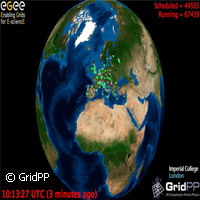Work on pan-European grid infrastructure moves to next level
Efforts to create a sustainable European grid infrastructure are being given a boost by the EU-funded EGI.INSPIRE ('EGI-integrated sustainable pan-European infrastructure for research in Europe') project, which has clinched EUR 25 million in support under the Research Infrastructures programme of the EU's Seventh Framework Programme (FP7). The resulting e-infrastructure will be made available to all European scientists and their international collaborators. EGI.INSPIRE led by the Dutch-based Stichting European Grid Initiative (EGI), is helping to continue the work initiated by the EGEE-III ('Enabling grids for e-science') project. Over a two-year period that ended in April 2010, EGEE-III targeted better grid standards and stronger commercial uptake. The project received EUR 32 million in funding under FP7. EGI-INSPIRE partners, including researchers, developers, resource providers, decision makers and end-users, attended a recent EGI technical forum in Amsterdam, the Netherlands to examine how best to make a sustainable grid infrastructure in Europe a reality. Kicked off in May of this year, EGI-INSPIRE brings together the solid know-how of national grid initiatives and European and international research organisations. The associated EGI encompasses more than 300 sites across 50 countries, offering some 24,000 processor cores, and more than 100 petabytes of tape and disk storage. The infrastructure is available to users 24 hours a day, 7 days a week. The 49-strong consortium will fund additional national activities with an estimated value of around EUR 300 million between now and 2014. These fresh investments will give the European grid computing service a big boost, effectively helping advance European research across the board including high-energy physics, ecology and climate modelling. 'The establishment of EGI marks a new phase in the provision of a Europe-wide e-infrastructure to support the capacity for transnational, large-scale, data analysis demanded by researchers in Europe,' explains Steven Newhouse, Director of EGI-INSPIRE. EGI-INSPIRE's undertaking complies with the objectives of the European Commission to break down any walls restricting free movement of knowledge across Europe. This drive, as underlined in the Lisbon Treaty, is acknowledged as the 'fifth freedom' for all EU Member States, after the free movement of goods, capital, services and people. The EGI technical forum was the first event to bring together all EGI-INSPIRE partners from Europe and Asia including Albania, Armenia, the Czech Republic, Denmark, Cyprus, Finland, France, Georgia, Germany, Greece, Hungary, Ireland, Italy, Japan, Lithuania, Poland, Portugal, Romania, Russia, Serbia, Slovakia, South Korea, Sweden, Switzerland, Taiwan, Thailand and Turkey. For his part, EGI council head Per Öster says: 'I am really happy about the commitment for EGI and EGI-INSPIRE from all the member countries and organisations. It demonstrates their strong belief in the mission to give an opportunity for all European researchers to access e-Infrastructure resources that meet their specific needs.'
Countries
Albania, Armenia, Switzerland, Cyprus, Czechia, Germany, Denmark, Greece, Finland, France, Georgia, Hungary, Ireland, Italy, Japan, South Korea, Lithuania, Poland, Portugal, Romania, Serbia, Russia, Sweden, Slovakia, Thailand, Türkiye, Taiwan



